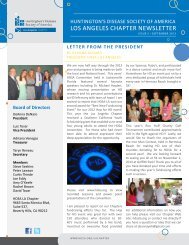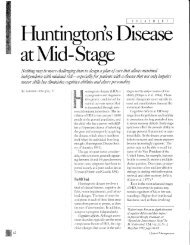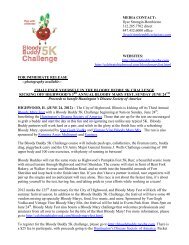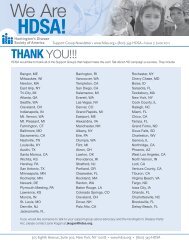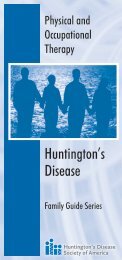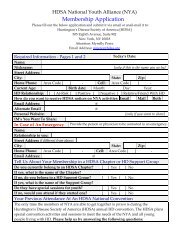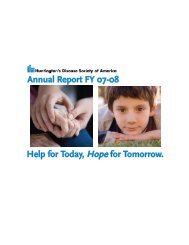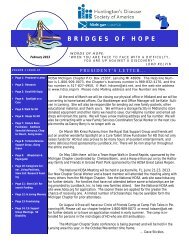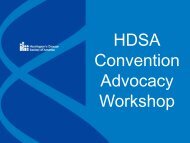Applying for Disability Benefits, by Jane Kogan, We Are HDSA, July ...
Applying for Disability Benefits, by Jane Kogan, We Are HDSA, July ...
Applying for Disability Benefits, by Jane Kogan, We Are HDSA, July ...
You also want an ePaper? Increase the reach of your titles
YUMPU automatically turns print PDFs into web optimized ePapers that Google loves.
<strong>HDSA</strong> In<strong>for</strong>mation<br />
Upcoming Educational Days<br />
<strong>July</strong> 9<br />
New Orleans, LA<br />
<strong>July</strong> 15<br />
Eastport, ME<br />
<strong>July</strong> 30<br />
Kirkland, WA<br />
August 13<br />
Lawton, OK<br />
September 17<br />
Englewood, CO<br />
If you would like any in<strong>for</strong>mation about<br />
upcoming educational days, please<br />
contact <strong>Jane</strong> <strong>Kogan</strong> at<br />
jkogan@hdsa.org.<br />
A Physician’s Guide<br />
Thanks to a generous educational grant<br />
from Lundbeck, <strong>HDSA</strong> is able to provide<br />
a complimentary copy of A Physician’s<br />
Guide to every HD family when they<br />
send or call the <strong>HDSA</strong> national office<br />
with the name, address and phone<br />
number of both the neurologist and<br />
primary care provider seen <strong>by</strong> your loved<br />
one with HD.<br />
Upon receipt, <strong>HDSA</strong> will send you one<br />
free copy of the all new A Physician’s<br />
Guide to you as well as a copy to your<br />
neurologist and primary care provider.<br />
Call Anita Mark Paul at 800-345-4372<br />
extension 219 or email Anita at<br />
amarkpaul@hdsa.org.<br />
Please Note: Your correspondence<br />
with <strong>HDSA</strong> is completely private.<br />
<strong>HDSA</strong> does not share any in<strong>for</strong>mation<br />
with Lundbeck nor the Doctors.<br />
Managing Advanced Directives<br />
Karen Baker, MSW, LICSW, <strong>HDSA</strong> New England Regional Social Worker<br />
Advance directives are instructions given <strong>by</strong> an individual specifying their wishes<br />
regarding end of life medical care and designating who should make medical<br />
decisions <strong>for</strong> them in the event that they can no longer communicate or make<br />
decisions. While various states use different language and procedures, this article<br />
covers some of the issues that are common to all.<br />
There are many benefits to completing your advanced directives. First is the<br />
protection of your rights to make your own decisions of what medical treatment you<br />
would or would not want. With advance directives in place, you will feel increased<br />
peace of mind knowing your opinions are known and your rights are protected. In the<br />
event of a medical emergency, medical professionals can immediately provide the<br />
level of care you have chosen, because they have been provided with written legally<br />
recognized directions in advance. Finally, tension and disagreement between your<br />
friends and family can be decreased if they do not have to question, wonder, or worry<br />
about medical decisions you would want to be made. Completing routine advanced<br />
directives while you are still healthy may prevent the need <strong>for</strong> a costlier, more<br />
time-consuming or more stressful legal intervention such as the designation of a<br />
Guardian in the future.<br />
There are several steps that can be taken to work towards completing your advanced<br />
directives. First, research the legal specifics in your state. You can start <strong>by</strong> asking<br />
your <strong>HDSA</strong> Social Worker or other Social Workers involved in your care <strong>for</strong> details<br />
regarding your state’s requirements. Several states’ government websites include<br />
in<strong>for</strong>mation or even a printable copy of the Health Care Proxy <strong>for</strong>m. States vary in the<br />
requirements regarding witness signatures. Some health care facilities may allow staff<br />
to sign as witnesses, others may not. Research the difference between a Health<br />
Care Proxy (designating who will speak <strong>for</strong> you when you cannot), a Living Will<br />
(written details of your general wishes), and more specific <strong>for</strong>ms.<br />
Once you understand the legal requirements in your state, you can begin to research<br />
and discuss your desired medical options. Speak to your doctor, neurologist, and<br />
other health care professionals. Utilize the in<strong>for</strong>mation available on the <strong>HDSA</strong> website<br />
to educate yourself regarding potential health issues. The major medical interventions<br />
one may or may not desire include artificial resuscitation, feeding tube, ventilator, and<br />
tracheotomy. Other treatments may involve psychiatric or pain medications. Also<br />
research the Hospice services available in your area. Consider your personal<br />
opinions regarding these interventions, and how your age, or cultural, ethnic, or<br />
religious background may influence your com<strong>for</strong>t with different options. <strong>We</strong> need to<br />
respect that different individuals will elect different choices.<br />
While a lawyer may not be required to complete a Health Care Proxy (HCP) <strong>for</strong>m in<br />
your state, you may benefit from legal advice if your family situation is more<br />
complicated with non-married partners, divorce or separation. A Living Will is a longer<br />
narrative describing your wishes. A helpful tool is the “Five Wishes” a check list listing<br />
specific ideas, see the website www.agingwithdignity.org. Currently this tool is<br />
considered legal in only 42 states, but even if not legal in your state you may find it<br />
helpful to spark thought and conversation.<br />
Consider who will make the best Health Care Proxy <strong>for</strong> you. It may not be your<br />
spouse, best friend, or closest relative. Someone may love you dearly, but if they are<br />
the type of person who becomes very anxious or uncom<strong>for</strong>table in a medical<br />
emergency they might not be the best candidate. Ideally, a good candidate to be a<br />
HCP is someone who understands how modern health care works, who can be<br />
reached quickly in an emergency, who will not “faint at the sight of blood,” and can<br />
respect your wishes. I believe it is best to ask someone if they will agree to be your<br />
HCP so that you can communicate your wishes. Your state’s policy may also give the<br />
(Continued on page 4)<br />
505 Eighth Avenue, Suite 902, New York, NY 10018 • www.hdsa.org • (800) 345-<strong>HDSA</strong>



